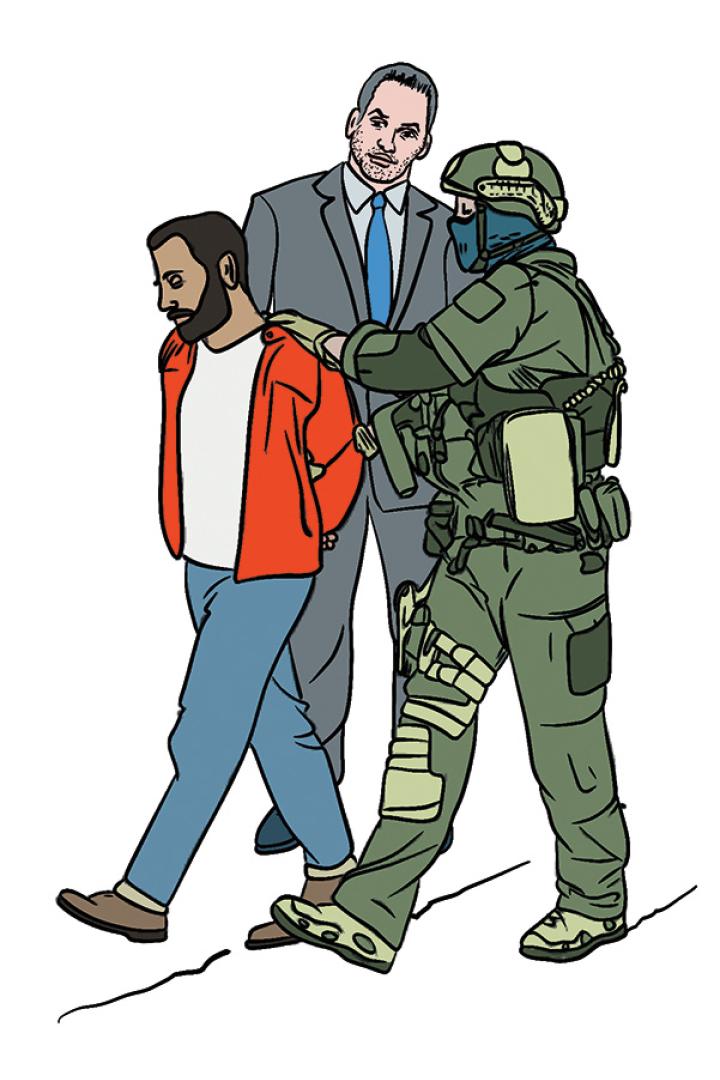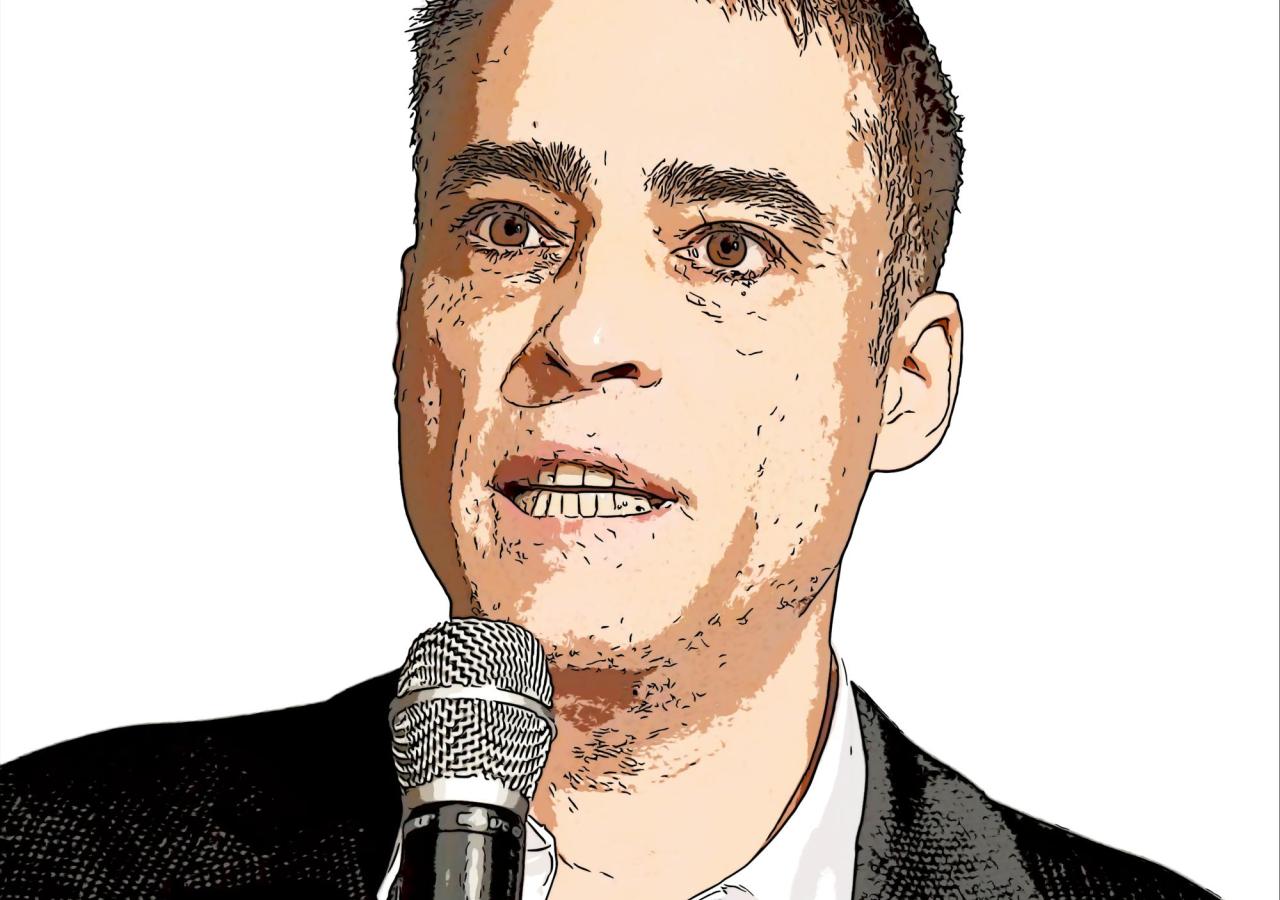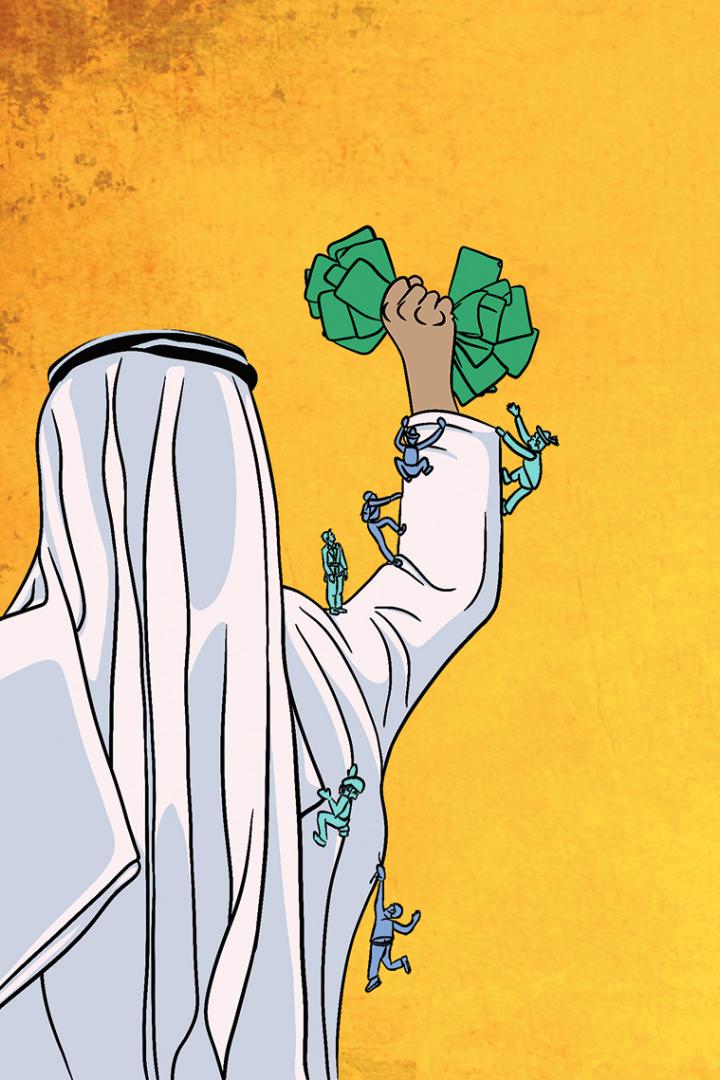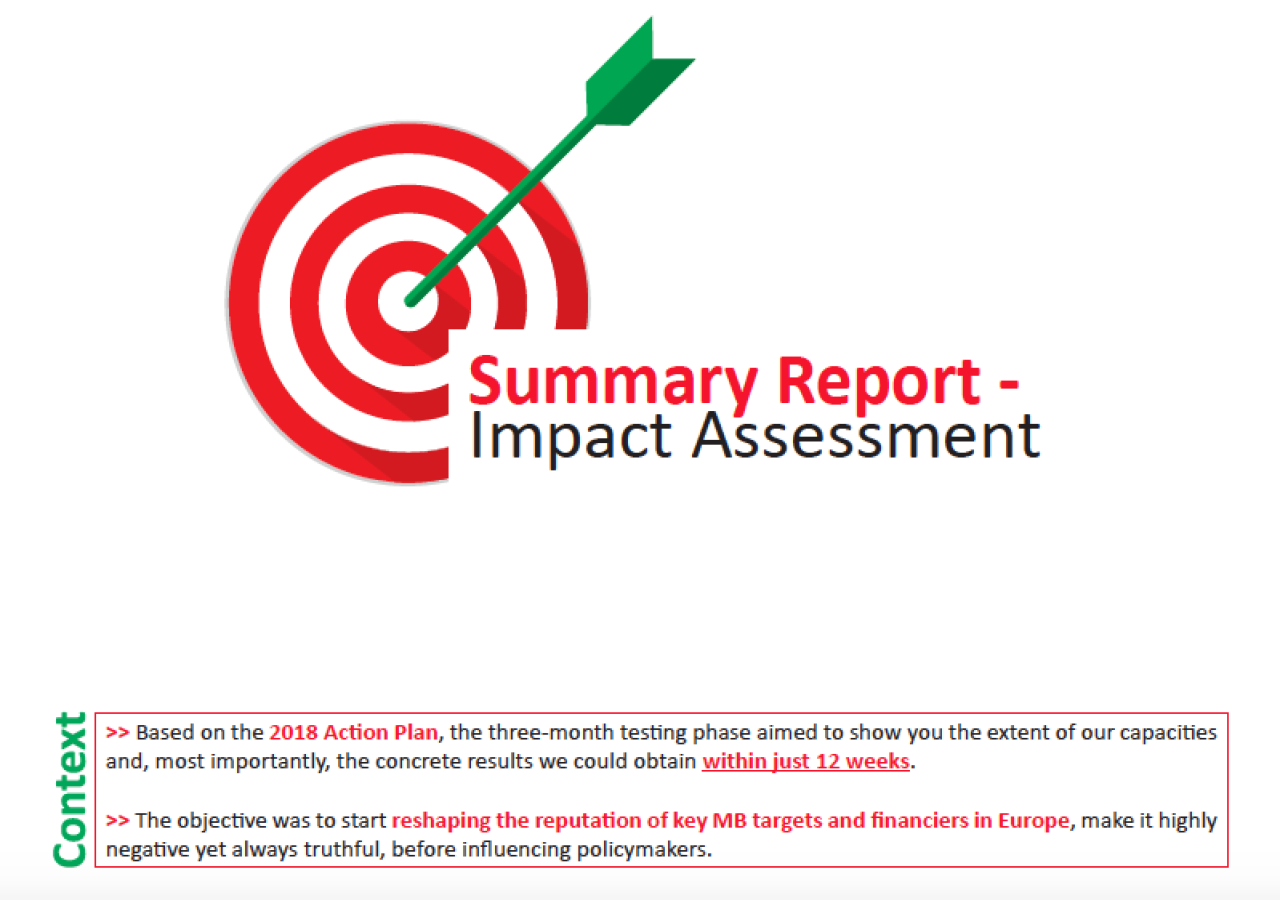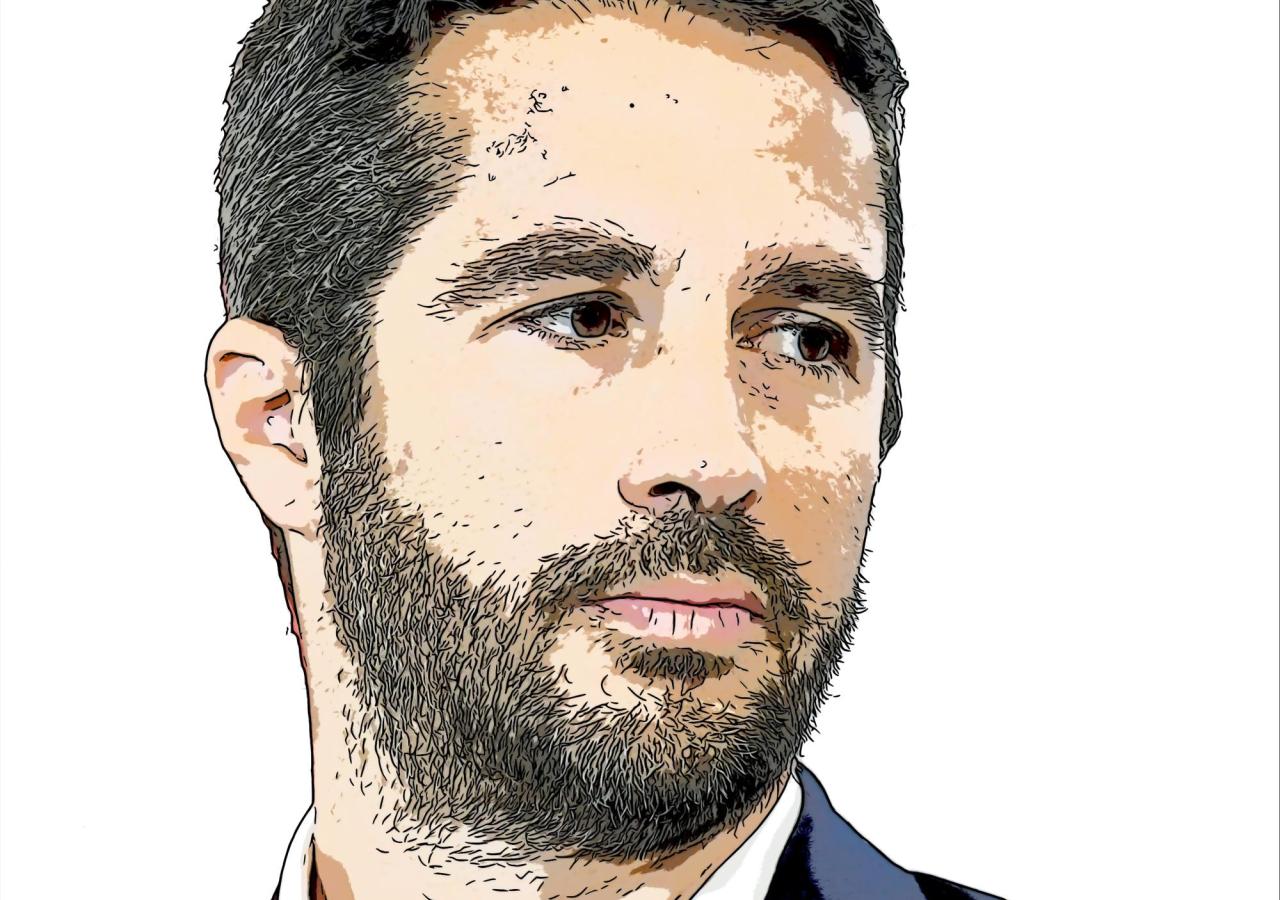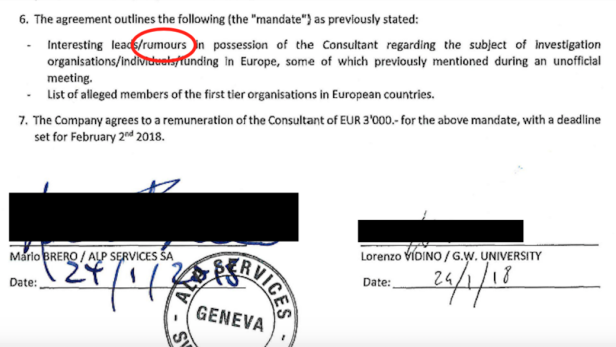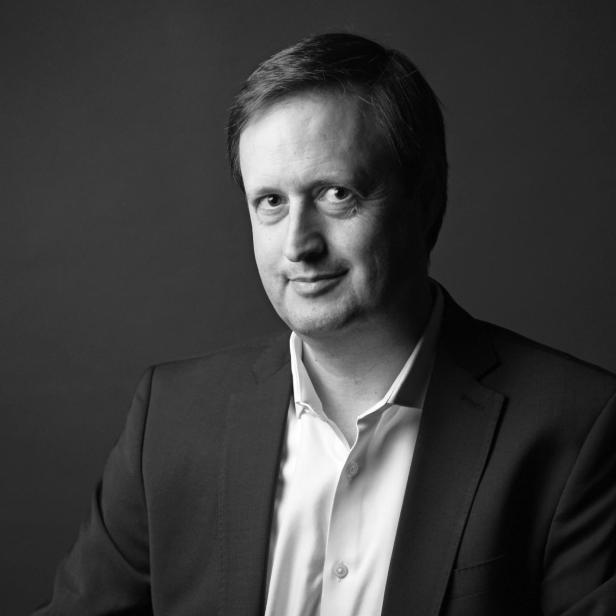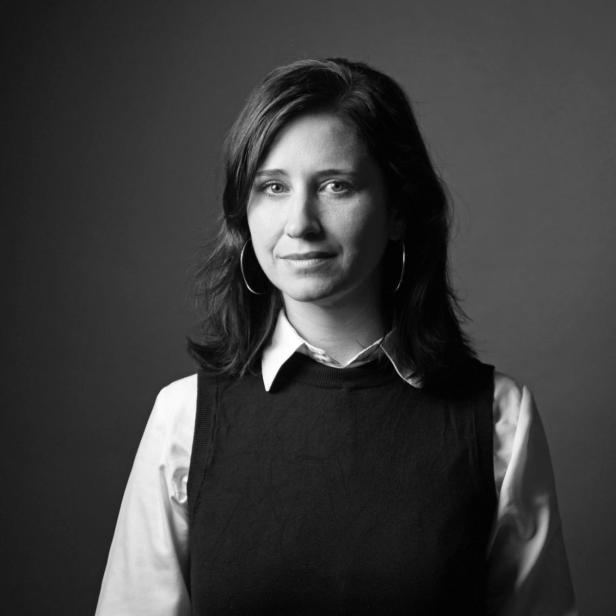Inside the United Arab Emirate’s spy campaign in Europe
In recent years, Abu Dhabi has become the focus of Austrian-Arab relations, which is also due to ex-chancellor Sebastian Kurz. In 2019, Kurz travelled to Abu Dhabi, bringing a horse of the famous Austrian Lipizzaner breed as a gift for the Crown Prince. In 2021, he signed a working agreement. In late June 2023, the now ex-chancellor wrote on "X" (formerly Twitter): "The development of the United Arab Emirates in the past decades is truly remarkable and impressive!" He is said to be doing business in the Gulf state. And not only him.
The money from the Gulf States
Austria has excellent relations with Abu Dhabi: political, economic and clandestine relations. The fight against the Muslim Brotherhood is a common denominator between the two states, and the Gulf state is willing to pay for it.
For years, the United Arab Emirates (UAE) have been using Europe as a geostrategic playground. profil has seen and analyzed tens of thousands of files. They show how, under the guise of the fight against terrorism, the sheikhs run large campaigns against their political arch-enemy Qatar. Qatar is considered the main supporter of the Muslim Brotherhood – an Islamic political movement which managed to increase its power during the Arab Spring about a decade ago and is considered a threat by ruling elites in the region.
In Europe the fight against Islamist terror is a major concern. Too much blood has been spilt in brutal attacks across the continent - including Vienna in November 2020. But considering its geostrategic interests: Are the UAE, of all countries, the best influencers for domestic politics? Have decision-makers, advisors and experts too easily engaged in a fight driven by the UAE’s self-interest? Have they lost sight of other, potentially more dangerous threats? Have they taken into account, that people might be unjustly persecuted and endangered? profil has followed leads from Abu Dhabi via Switzerland to Austria.
Generous Friends
Ex-ÖVP chancellor gave the crown prince of Abu Dhabi a Lipizzaner-Horse as a gift during a state visit in 2019.
The former minister
Two decades ago, Herbert Scheibner was a famous man in his home country of Austria. Crowds took to the streets against him and his political comrades-in-arms. In early 2000, Scheibner, a member of the rightwing “Freedom Party” (FPÖ), had been sworn in as defence minister. It was the first time the conservatives, then led by chancellor Wolfgang Schüssel (ÖVP), brought the Freedom Party into government. Scheibner has left politics long since, today he is an entrepreneur and serves as president of the "European Institute for Counter-Terrorism and Conflict Prevention" (EICTP). Vice president of the association is Gustav Gustenau, a prominent brigadier who retired from the army about two years ago.
Scheibner already established contacts in the Gulf states during his time in politics. Today, he is quite close with the UAE. The EICTP was founded in 2018; in 2019, it presented itself as a "partner institute" of the large Abu Dhabi-based think tank "Hedayah". In January 2020, a cooperation agreement was signed with the Emirates Center for Strategic Studies and Research (ECSSR).
Herbert Scheibner (60)
Herbert Scheibner is an entrepreneur. The long-time politician (first FPÖ, then BZÖ, both right-wing Parties) was appointed Minister of Defence in 2000. Already during this time he built up good relations to the Arab world. Today, Scheibner owns a company, is vice president of the Euro-Arab Initiative for Reconstruction and Development, and is head of the think-tank EICTP, which allegedly deals with counterterrorism.
At the same time, the EICTP took off in Austria: In 2020, a controversial "exploratory study" was conducted on mosques in Styria's capital Graz. Terrorism expert Nicolas Stockhammer became the institute's "senior consultant". After the terrorist attack in Vienna in November 2020, Stockhammer became the country's top researcher on terrorism. In 2021, the Ministry of the Interior, then led by current chancellor Karl Nehammer (conservative ÖVP), put its weight behind a research project headed by Stockhammer. The project was established at the Danube University in Krems and funded with almost 900,000 euros.
Another initiative, the "Documentation Centre Political Islam", established shortly before the terror attack in Vienna, relies on the know-how of the EICTP – as does the "Centre for Military History and Social Sciences" of the German Armed Forces in a project on hybrid warfare.
When it comes to high-level networking at home and abroad, it is remarkable to see what, in very little time, an ex-minister and an ex-army-officer have put together with a handful of employees and a pool of freelance experts like Stockhammer.
What profil's research has now brought to light seems all the more alarming. Investigations show that the EICTP has recently been working on an "actor analysis" on political Islam and the Muslim Brotherhood. The analysis names numerous people, including members of parliament, putting them in a skewed light. profil has been told, that these lists were supposed to be sent to the UAE – which Scheibner vehemently denies.
Friend-foe scheme
A document available to profil claims the Green MP and integration spokesperson, Faika El-Nagashi, has close connections and friends in the milieu of political Islam – referring, for example, to "The Muslim Youth of Austria" and a political scientist who has criticized the Islam policy of ÖVP as tendentious and confrontational. "As a politician, I have been responsible for integration in various functions since 2015 and the exchange with organizations in this field is part of my daily business," El-Nagashi tells profil. “The report aims to damage my reputation and thus does massive damage not only to me as a member of parliament, but also to the reputation of the Republic."
Stephanie Krisper, MP for the liberal NEOS party and a human rights expert also ended up in a document written for Scheibner’s think tank. It is suggested, that representatives of political Islam might have successfully approached Krisper. It is claimed, for example, that Krisper hired political scientist Farid Hafez as an advisor during negotiations on a new Islam law in 2015 – and later stood up for him when he became a suspect in "Operation Luxor" (a major crackdown on alleged members of the Muslim Brotherhood) in 2020. Furthermore, the document suggests that Krisper had asked several critical parliamentary questions and had appeared in a "propaganda documentary" produced by the Qatar-based Arab news channel "Al Jazeera". It is claimed, that Krisper shared the "spin of Farid Hafez" that "Operation Luxor" may have been initiated by "foreign intelligence services (UAE, Egypt, Israel)".
It is important to know that in the meanwhile the suspicion against Hafez has vanished, just like those against numerous other people, "Operation Luxor" had focused on. In response to a profil enquiry, Krisper said: "I have only been a member of parliament since 2017 and therefore couldn’t have entrusted Farid Hafez with whatever in 2015 - apart from the fact that I have never been responsible for or involved in such issues subsequently. I have only seen Farid Hafez once or twice in my life. It is inconceivable and must be clarified who is financing these opportunistic, highly irritating activities and how the information was generated. Non-governmental institutions may have been involved, too."
The Operation Luxor
The raid in November 2020 was one of the largest police operations since 1945. It was directed against the alleged Muslim Brotherhood. Former Interior Minister Karl Nehammer turned it into a PR spectacle. Today, there is actually nothing left of the accusations.
But who has been supplying the EICTP with such questionable expertise? According to research conducted by profil, (among others) the historian Heiko Heinisch and the political scientist Nina Scholz have been involved. Heinisch and Scholz are prominent experts in the field of Islamic studies – but have faced quite some criticism. In the public prosecutor’s investigation against the Muslim Brotherhood which led to "Operation Luxor", they acted as expert witnesses. The allegations against alleged members of the Muslim Brotherhood were largely based on their assessments. The defendants objected, and Heinisch and Scholz were eventually dismissed as experts by the court on grounds of bias.
Profil’s editor-in-chief Anna Thalhammer criticized Heinisch and Scholz in the course of earlier reporting on "Operation Luxor". Now Thalhammer is also found in EICTP’s "Actor Analysis". It is claimed that Thalhammer grew up together with Farid Hafez in the town of Ried im Innkreis in Upper Austria. Thalhammer, the document further claims, reported false information about "Operation Luxor" and the related experts. According to the document, Thalhammer's first major article after she left the daily newspaper "Die Presse" to join profil had been about "Operation Luxor". It is claimed, that Thalhammer had partly taken over Farid Hafez's spin and had suggested – without evidence – that the UAE could be behind the operation.
The claims are largely wrong. "I did not grow up in Ried im Innkreis – and certainly not with Farid Hafez,” says Thalhammer. “The story was not my first big one for profil either. The document mingles personal issues with alleged scientific expertise. The fact that a critical journalist is being denounced by means of false allegations is not only questionable, but also potentially dangerous."
Rumours versus facts
A possible passing on of profiles of alleged Muslim Brotherhood sympathizers – no matter how far-fetched the allegations may be – could have serious personal consequences. Especially if the people named are of Arab origin, like the Viennese municipal council member Omar al-Rawi from the Social Democratic Party (SPÖ).
According to research done by profil, there is an EICTP info sheet on him. It accuses al-Rawi of having links to the Muslim Brotherhood, being a "pure brother" and that his attitude towards violence is one of "political legitimation".
This is stunning news to Al-Rawi: "I have won several lawsuits against those who claim that I am a member of the Muslim Brotherhood. I am not. But Heinisch continues to make the claim despite knowledge of these judgements, and what's more: these claims end up in dubious institutes, and from there perhaps go to other countries. I am of Arab origin; such an attribution is a great danger for me and my family. It can even mean danger to one's life if one enters the wrong countries and ends up on an enemy list because of such slander. In some parts of the world, that can mean the death penalty."
Scheibner and Gustenau – as well as Heinisch and Scholz – claim that the analyses, which have existed for years, were intended as internal working documents only. They "were and are being prepared and updated by several international experts", they say in a written statement. How many of these "external" experts have had access to the document, which was supposedly meant for internal use only? And why was it translated into English? Because that is the language of the institute, says Scheibner.
In fact, however, the EICTP runs a small, German-speaking office operation in Vienna's first district. It doesn’t seem to be completely out of question, that passing on the highly problematic analyses to members of a “pool of experts” might have at least been considered. On the other hand, the EICTP’s expert pool has not been made completely transparent to the outside world. And not all international experts in the relevant field have the best reputation.
Scheibner and Gustenau now claim that MPs and journalists no longer appear in the "current version" of the analysis. What exactly does that mean? Since Thalhammer has only been profil’s editor-in-chief since March 2023, there has at least been one update since then.
Is the EICTP a gateway for interests of the United Arab Emirates? profil does not have any definitive proof that the “Actor Analysis” was passed on. However, the focus on political Islam and the Muslim Brotherhood strikingly coincides with the interests of the UAE, where the Scheibner Institute has two cooperation partners. Scheibner vehemently denies any instrumentalization or lobbying activities. He claims, that there has been no cooperation with the ECSS in Abu Dhabi so far – and that Hedayah, on the other hand, is a recognized international organization.
Heiko Heinisch (56)
Heiko Heinisch and Nina Scholz like to appear as a twosome. They publish controversial, popular science books as well as newspaper-articles on the topic of "political Islam". They were court-certified Experts for Operation Luxor – and dismissed by the High Court of Graz due to bias. Heinisch is still a member of the advisory board of the Documentation Center Political Islam. In spring 2023 the two were co-authors of a study commissioned by the Ministry of the Interior.
The data leak
Russia, the USA, Chin, the rich Gulf states: It is not unusual that world powers try to extend their influence by means of manipulative lobbying methods. However, only in a very few cases it is revealed, exactly how and through which clandestine channels the manipulation efforts take place.
Thousands of electronic files available to profil show: In order to push their cause, the Emiratis invested millions of euros in Europe. The Gulf state pursues alleged supporters of the Muslim Brotherhood all over the world and carries out special operations against them. In Europe, this is framed as a "fight against political Islam" – a popular catchphrase on the Christian continent.
The analysis of the data shows how well-structured and extensive such dirty campaigns are conducted in Europe.
Millions for Europes
The dataleak reveales, how professionally, meticulously and dirty the Emirates' campaigns were set up and executed. Austria was a fertile ground for this.
The data originates from a leak at the private Swiss intelligence service "Alp", which has its headquarters in Geneva. According to its own presentation documents, Alp employs around "20 analysts, investigators and full-time consultants with extensive, multi-disciplinary backgrounds in law enforcement, intelligence, criminal, cyber and financial forensics, international finance and banking, academia, law and journalism".
Alp is said to have carried out special intelligence missions for its clients. Among these are, according to the data, controversial Israeli millionaires as well as now-sanctioned Russian oligarchs. “Specifically, we have acted on behalf of several Head of States, for example before political campaigns or sensitive events and other notorious ultra hith-net-worth individuals”, the service writes about itself in a presentation document.
A good client
profil has seen long lists of payments, which show how much money the UAE have provided to Alp over the years: It were millions of euros – meant for denunciations and dirty campaigns.
"Your Excellency, Since August 2017 we have had the great honour to provide our services to your country; a privilege for which we are deeply grateful", writes Alp boss Mario Brero, once a journalist, in a letter marked "top secret" to a high-ranking representative of the United Arab Emirates. He then goes on and brags about what they have been able to do for the client so far"As previously mentioned, our services cover a wide range of areas such as advanced integrity investigations (i.e. finding negative information/red flags on individuals or companies, worldwide), litigation support, asset searches, fraud investigations, intellectual property investigations, reputation management, crisis management and security consulting (surveillance operations)". In addition, "we have developed advanced skills in conducting confidential, offensive, viral communication campaigns (...) which could be very valuable in our cause," Brero directs.
"Our cause" refers to the fight against the Muslim Brotherhood on European soil. Alp’s services have have apparently been happily used for several years. The private intelligence firm started its professionally planned campaigns in core countries such as Switzerland, France, Belgium and Great Britain – but eventually the actions were rolled out to a total of 29 European countries and the USA.
The procedure followed an elaborate strategy, which was detailed in "action plans" marked as "top secret".
Step one: Target identification
To this end, Alp drew up huge networks of politicians, organizations and important people in the Muslim sphere. Five to ten main targets were then distilled from these enemy lists. Afterwards it was defined how these targets could be attacked and discredited. For example: "Our target would be extremely negative and discriminatory information." This would include "embarrassing personal information such as (the sex lives of the many young mistresses, lax religious practice when not in public), uncovering unconventient ties with Q (note: Qatar) or the Muslim Brotherhood (e.g. secret funding of "independent" journalists or think-tanks) or other weak-points (e.g. extremist/radical positions held in privateby these targets which should shock the Western public/media).
Priorities were set: "We will focus on the following aspects: Funding. Links to terrorism, corruption, money laundering or other crimes. Islamic centers, mosques, schools. Connections to political parties. Influence on European politicians,"a presentation reads. Costs? Up to 60,000 euros per person.
Action-Plans
profile found a lot of such actions plans. The goal: To discredit muslims in 29 countries.
After all, from these individual stories a bigger picture should be drawn, which the Emirates wanted to show to western countries: The Muslim Brotherhood is not only a threat to us, but also to you.
At this point, however, someone was needed to make these stories credible.
Networks and Spys
Such network graphics of the alleged Muslim Brotherhood were provided for the whole of Europe. The information for this was also provided by a network of spys and informers. Vidino delievered long lists of names.
Step 2: The media
Apart from the fact that some journalists were on Alp's payroll as informants, profil has seen long lists of media representatives who were considered by Alp to be "suitable". To ensure that they would find suitable information in possible cross-checks, new websites were to be created and hundreds of Wikipedia articles were to be changed accordingly.
In addition to the negative campaign against the Muslim Brotherhood, a positive campaign was also set up for the Emirates: "The aim would be to enhance your online reputation and counter hostile media actions from Q and its influence network, notably via the creation of quality, positive content that would appear in the first pages of Google and other social media, the creation of credible new media, solid counter-arguments focused on local audiences, enhancing your Wikipedia pages."
After that, step 3 should follow suit: influencing decision-makers. The goal: "provoke a public and political debate". Alp promised: "We will chose the most appropiate media and lobbying channels for each case and reach out tot he most relevant actors."
Refence was given to a whole list of cases, where – as Alp claimed – their approach had successfully worked in the past.
The informers
In order to get their hands on useful information, Alp needed a network of informants and spies. These were individuals with knowledge of local Muslim communities who provided the appropriate names and rumors. Alp's pool of informants is truly remarkable, but one person stands out: Lorenzo Vidino. The man who calls himself a researcher on terrorism and Islam has been in Alp’s service since 2018, as a contract obtained by profil shows. Vidino maintains best connections to the UAE.
Lorenzo Vidino (46)
The Italian-Austrian author has been Program Director at the George Washington University for Extremism since June 2015. He is a member of the scientific advisory board of the Documentation Centre Political Islam in Austria and published a much criticised study on the Muslim Brotherhood in Austria. He had a key role in the investigation of Operation Luxor. The "New Yorker" published an article in March 2023 criticizing its cooperation with the United Arab Emirates through the private intelligence service Alp. Vidino is part of the think tank "Hedayah", which is based in Abu Dhabi.
"The Consultant will abstain from disclosing the Company's name, as the Company will abstain from revealing the Consultant's name", the contract says. According to the agreement, Vidino is supposed to deliver: "Interesting hints/rumors" about "organizations/individuals/funding in Europe, some of which previously have mentioned during an unofficial meeting."
And Vidino delivered: rumours, company names, investigation documents and a page-long list of people allegedly belonging to the Muslim Brotherhood from a total of 13 countries. Among them were several people living in Austria. No surprise, Vidino is a sought-after man in this country – especially for organizations close to the government. Vidino, like Heinisch, is a member of the advisory board of the "Documentation Center for Political Islam". Set up by ÖVP-minister Susanne Raab, the center has also been in contact with Scheibner's EICTP (see above).
Vidinos Contract with Alp
Vidino likes to pretend to be a scientist - but also worked for the private intelligence service. He also sold rumours - that has nothing to do with science.
Vidino's name first appeared in 2017 when he was commissioned to conduct a study on the Muslim Brotherhood in Austria. His clients: the Integration Fund (ÖIF), which was part of the Foreign Affairs Ministry (the minister at the time was Sebastian Kurz), and the Federal Office for the Protection of the Constitution and Counterterrorism (BVT). The result was presented in September 2017, perhaps not entirely coincidentally before the parliamentary elections.
The European popular petition "Stop Extremism" was launched at the same time. Figurehead was the Austrian Efghani Dönmez, candidate for the ÖVP in the election. Back then, internal documents available to profil revealed that massive lobbying against the Muslim Brotherhood was carried out under the guise of fighting terrorism – and that a lot of money was behind it. At that time, Dönmez denied everything, as did Ingo F., the head of the Austrian Society for Political Analysis (ÖGP), which organized the petition for a referendum.
In Alp’s leaked documents there is a memo which states: "Probably the most successful operation with UAE influence in Europe was executed by the Vienna based ÖGP. The organization worked clearly in the shades through multiple outlets and only was outed during the recent electoral campaign in Austria" And: "The Austrian organization is behind the following projects and campaigns." Named is the so-called "Map of Islamism", which listed hundreds of allegedly Islamist companies and NGOs. "The Global Muslim Brotherhood Daily Watch” and "Stop Extremism" are only two of them. The memo contain detailed records of who F.'s contact person in the Emirates was - and who he had to report to. "The reports provided by the ÖGP went to the Minister of the Interior and the Crown Prince", it says. Ingo F. did not respond to profil.
Back to Vidino: At the time the study was published, his work was already massively criticized. He attributed people from the Muslim sphere to the Muslim Brotherhood, they felt slandered. Many of those names ended up with Alp - and many of them later became suspects in the so-called "Operation Luxor". For this criminal investigation, Vidino's study was a main basis.
Dangerous lists
Vidino delivered lists of names - also for Austria. Alp used them for presentations for the clients.
Escalation: The raid
On November 9th, 2020, alleged Muslim Brothers in Vienna, Lower Austria and Styria had their houses raided. It was one of the largest police operations in Austria in recent history: officers had been observing the targets for a total of 21,000 hours. Then 960 police officers carried out raids in around 60 flats, businesses and club premises. In the preliminary proceedings, more than 100 suspects were listed – but so far nothing has come out. On the contrary: the Higher Regional Court of Graz (OLG) tore apart the investigations, which were based on anonymous tips, Vidino's study and an expert opinion by the above-mentioned Heinisch and Scholz. The latter two were recalled for bias after a legal battle by the accused.
Alp was immediately informed of the house search by one of their sources at the time. Via Protonmail (i.e. anonymously and encrypted), a representative of Alp wrote to his contact in the UAE on November 9th: "As you may have seen and as we wrote on August 24th, the Austrian authorities is currently conducting a massive anti-terror counterterrorism against the MB, “operation ramses”. (...) The public prosecutor's office in Graz declared: 'The Muslim Brotherhood is not a religious community, but stands for religiously motivated political extremism'".
The mail correspondence of August 24th stated the following: "Confidential, Austria is planning to be more aggressive in the coming months with the local MB".
The operation had been kept top secret before the raid. So who informed Alp about it? Vidino claims it wasn’t him. "Anybody who had read Austrian papers - including your highly informative reporting - around that time knew that the Austrian government was enacting many measures against the MB. Also, as I stated earlier, I did not know in advance that Luxor was taking place. I was asked to provide a testimony about the MB in March 2020 but had no idea what that was for," he tells profil. Nor, he claims, did he know whereto Alp was delivering information that came from him. He, Vidino, had thought it was for a British law firm. That is what he had been told, he tells profil. He apparently did not make any further inquiries.
Arab-Austrian friendship
Austria is fertile ground for the UAE's intelligence activities because there are shared interests. Alp also came to this conclusion: "We should get involved there, the political situation is favorable," it says in a memo.
With the refugee crisis in 2015 and the rise of the conservative ÖVP, the fight against political Islam became a political battlefield. Muslims were increasingly criminalized. The police closed mosques (that had to be reopened shortly afterwards), a stricter Islam law was passed, “values courses” became state of the art, a headscarf ban in primary schools was introduced (and later overturned by the Constitutional Court).
The Austrian Integration Fund, which was close to Kurz when he was a minister and became chancellor afterwards, was given a lot of money and drummed up conservative politics. Finally, the Documentation Centre for Political Islam was founded in the summer of 2020. All of that climaxed in the Operation Luxor, marketed by politicians as a PR coup. Then-Minister of the Interior Karl Nehammer and his video team were at the side of the police officers that night.
The investigation file shows, that some information used in Operation Luxor had been obtained from Arab security services. According to information obtained by profil, it was - unsurprisingly - the Egyptian secret service that got involved in the initial phase. Others followed.
In any case, the relationship between Austria and the UAE is so close that ex-Chancellor Sebastian Kurz signed a working agreement with Mohamed bin Zayed Al Nahyan, Crown Prince of Abu Dhabi, in the summer of 2021. It was intended to reaffirm that relations between the UAE and Austria have witnessed significant progress during the past few years. These relations are built on mutual trust, respect, and shared interests to ensure continued development and prosperity for the people of both countries.
The cornerstones for this treaty had already been set at meetings in 2018 and 2019, the letter said – and were now, in July 2021, ready to be signed. "Both countries envisage to work together in facilitating efforts to promote tolerance, combat international crime, extremism and terrorism, and to jointly work on the implementation of the Sustainable Development Goals (SDGs)," it reads.
Kurz is now an entrepreneur just like Scheibner, but his friends from the Arab world have not forgotten him: Up to this day, Kurz has excellent connections to Abu Dhabi - as does Scheibner.
Heinisch and Scholz work on actor analyses for the latter, probably not for free. They don't want to say exactly how much money they get. The EICTP is also holding back with information. What Vidino in turn has to do with the Scheibner Institute seems a little blurred. "Mr. Vidino is one of the leading international experts on the Muslim Brotherhood and is part of our network of experts," the EICTP says upon request. Vidino, in turn, does not want to hear about it: : "I think you are misinformed here, as I don't work for the EICTP, I'm at GWU. (note: George Washington University)”. One thing is certain: they know each other and they cooperate – the Scheibner Institute with George Washington University, and Vidino (like Scheibner) with the Abu Dhabi-based think tank "Hedayah", which is mainly headed by representatives of the ruling royal family of Abu Dhabi. Ingo F. of the EU popular petition "Stop Extremism" is also said to still being involved in this environment.
At the end of the day, the UAE's campaign is trying to do exactly what they accuse the Muslim Brotherhood of doing: an infiltration of institutions. Although the Austrian leadership knows about this, it apparently doesn’t do anything against it.
Translation: Siobhan Geets
Illustration: Jorghi Poll





